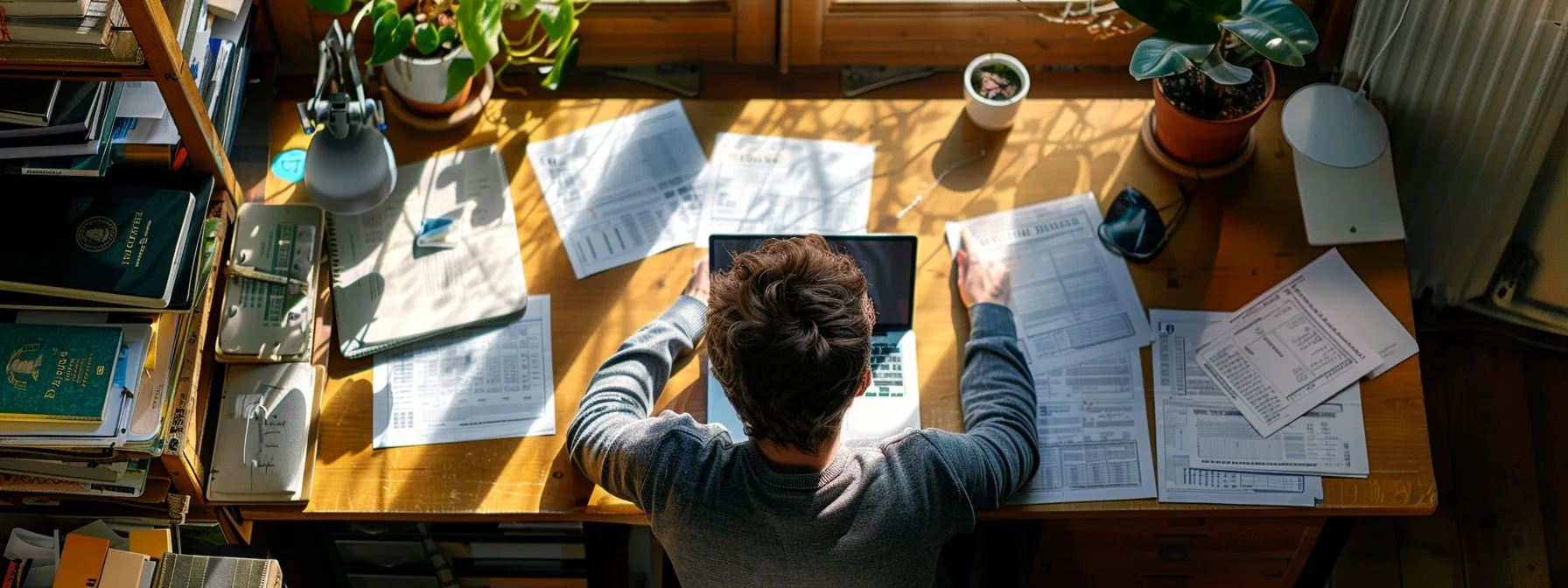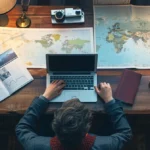Table Of Contents:
- Navigating the Digital Nomad Visa Process
- Key Takeaways
- Table Of Contents:
- Key Takeaways
- Understanding the Basics of Digital Nomad Visas
- Define What a Digital Nomad Visa Is
- Identify the Countries Offering Digital Nomad Visas
- Evaluating Your Eligibility Before Applying
- Check the Financial Requirements
- Understand the Legal Obligations and Restrictions
- Gathering Essential Documents for Your Application
- List of Common Documentation Needed
- Tips on Getting Your Documents in Order
- Choosing the Right Country Based on Lifestyle and Cost
- Analyze Living Costs and Quality of Life
- Benchmark Internet Speed and Co-Working Spaces
- The Application Process From Start to Finish
- Registering With Online Platforms or Embassies
- Conclusion
- Leave a Reply Cancel reply
- Frequently Asked Questions
- What exactly is a digital nomad visa?
- How do I determine if I’m eligible for one?
- Which documents are necessary for the visa application?
- How should I select a country for a digital nomad visa?
- Can you describe the steps of the visa application process?
- Conclusion
Navigating the Digital Nomad Visa Process
As an international digital worker, the allure of earning an income while traversing the globe is not just a dream but a tangible reality thanks to the internet. The concept of ‘digital nomad‘ has transformed work and lifestyle, freeing many from the traditional office space and, in some cases, offering tax benefits that help steer clear of falling into financial hardship. Yet, as appealing as this nomadic life seems, navigating the intricacies of digital nomad visas can be a challenge, requiring a thorough understanding of regulations that vary from country to country. In this article, I’ll walk you through the essentials of securing a digital nomad visa, helping you comprehend the entry requirements, process intricacies, and aligning your choice with your lifestyle preferences and budget considerations. Keep reading to take the first step towards a fulfilling journey of freedom and employment fluidity.
Key Takeaways
- Financial preparedness is integral for securing a digital nomad visa
- Legal and health documentation are critical components of the visa application process
- Reliable internet and co-working spaces are essential for a digital nomad‘s productivity
- Thorough research and understanding visa intricacies ease the process of traveling and working abroad
- Sharing experiences with the digital nomad community helps others navigate complex visa procedures
Table Of Contents:

As an international digital worker, understanding the ins and outs of the earned income tax credit is paramount when considering a digital nomad visa. Relocating to a new country often alters tax obligations, and staying informed about how to claim legitimate credits can significantly affect my bottom line.
Considering profit margins is a fundamental aspect of maintaining a sustainable digital nomad lifestyle. The ability to legally work in a different country often hinges on demonstrating financial stability, and a healthy profit from my online ventures ensures I meet the monetary requirements set by many visa programs.
I’ve learned how vital it is to have a comprehensive insurance plan that covers me internationally, especially as I transition into the role of a digital nomad. Access to dependable insurance coverage is not only reassuring but sometimes a compulsory condition for obtaining certain visas.
Before making the leap to a new country, it’s critical to manage my finances, including setting up a bank account that suits my nomadic lifestyle. Doing so simplifies the payment process for my clients, ensuring seamless transactions regardless of my geographic location.
Get ready to arm yourself with invaluable insights on the most flexible work and travel visas. With these key takeaways, you’ll be set to conquer borders and redefine the freedom of your digital workspace.
Key Takeaways

In my experience, choosing the right online banking service is paramount for a digital nomad. A platform that offers robust security features and low international transfer fees has proven indispensable in managing my finances from anywhere in the world.
I’ve realized the importance of an online savings account that boasts competitive interest rates, helping my earnings grow while I focus on my work and travel. An account optimized for international access ensures my savings don’t stagnate, no matter how many borders I cross.
Being always on the move, I can’t overstate the convenience that mobile banking has provided me. Not only does it allow for swift management of my finances, but the best services also minimize transaction fees, increasing the value I get from each payment or transfer.
Ultimately, my financial agility as a digital nomad has been vastly improved by mitigating banking fees, an effort that has led to more sustainable travel and a greater sense of financial security. Finding the right financial institutions that understand the essence of a nomadic lifestyle has been key to achieving this. adapting professional life across continents
Now that we’ve highlighted the essentials, let’s navigate the fundamentals of digital nomad visas. A deeper understanding lays the groundwork for your global office adventures. For those considering the digital nomad lifestyle, full time travel on tourist visas offers insightful guidance and essential tips.
Understanding the Basics of Digital Nomad Visas

Stepping into the world of a digital nomad means understanding the intricacies of new visa categories, specifically designed for people like me who work remotely and crave the flexibility to travel. A Digital Nomad Visa not only recognizes our unique work situations but also provides a legal framework to reside, often for extended periods, in foreign nations while continuing our digital ventures. Countries far and wide, recognizing the growing trend of remote work, are opening their doors to our unconventional lifestyle with such visas. As I plan my travels, I prioritize destinations that offer these progressive policies. The ease of managing my finances, whether it’s withdrawing cash from an automated teller machine, swiping my debit card at a local cafe, settling accommodation with my credit card, or scheduling a wire transfer to pay for a co-working space, hinges significantly on the local banking infrastructure and my visa’s permissibility.
Define What a Digital Nomad Visa Is
A Digital Nomad Visa is a type of authorization that permits individuals like myself to live in a foreign country while working remotely for clients or companies that may be located elsewhere. This innovative visa category is a response to the modern needs of global professionals who earn their money through digital means, offering the freedom to manage wealth without being tied to a single location, while ensuring compliance with local tax regulations.
With this specialized visa, my financial transactions, such as direct deposit of earnings, become hassle-free, as local banking laws align with the requirements of a Digital Nomad Visa often include protection against complications like overdraft, while the availability of a mobile app for day-to-day banking tasks streamlines my wealth management, allowing me to focus on my professional pursuits and cross-border adventures.
Identify the Countries Offering Digital Nomad Visas
The quest to identify countries that welcome digital nomads often leads to jurisdictions that have adjusted their regulations to accommodate this new wave of workers. For instance, some nations provide visas based on an investment into the local economy, which could be through property purchase, thus satisfying mortgage prerequisites, or by opening a deposit account with a substantial initial contribution, aligning with their economic goals while offering us the flexibility we yearn for.
A handful of countries are taking a more progressive approach by allowing digital workers to prove their financial stability through means such as a consistent payroll history, instead of demanding a loan or investment. These nations recognize the value of digital talents and are creating avenues for us to bring our expertise to their shores, subtly reshaping their mortgage and deposit account policies to be more inclusive for remote working professionals.
Now, let’s shift focus to a pivotal step: assessing your qualifications. Mastering the eligibility criteria can set you on a clear path to securing your digital nomad visa.
Evaluating Your Eligibility Before Applying

Before I take the plunge and apply for a digital nomad visa, thorough preparation is essential. In my journey, the first step involves meticulously checking the financial requirements set forth by my destination country. Each application process requires evidence that I can support myself financially—whether that’s through showing wire transfer records, cheque stubs, or payments through platforms such as Zelle. Simultaneously, it’s wise to consider if my assets, such as a home equity line of credit or any other line of credit I have available, can fulfill part of these requirements. Alongside fiscal preparedness, understanding the legal obligations and restrictions inherent to these visas is equally critical. Ensuring my work and lifestyle comply with local laws is fundamental to securing—and maintaining—my status abroad.
Check the Financial Requirements
Before I consider setting foot in Italy or any destination that beckons with the promise of remote work, my attention turns to the fine print of financial requirements. Working closely with private banking services, I take the time to collate all facets of my financial health—ensuring I can substantiate my ability to support myself without becoming a liability to the host country.
- Comprehensive review of my income sources from employment
- Assessment of continuous financial stability for the period of stay
- Verification of funds through private banking statements
It’s paramount to methodically delineate my earnings as evidence, showcasing a clear connection between my remote work endeavors and consistent financial inflow. Whether through Italy‘s lush countryside or in the heart of its bustling cities, my goal is to demonstrate to the authorities an unassailable case of steady income and financial autonomy.
Understand the Legal Obligations and Restrictions
Being aware of the legal obligations is paramount, and for someone like me, planning to venture across European Union borders, it means securing more than just a travel visa. Aligning with the laws of each country, I must secure a residence permit which acts as a cornerstone of my legal presence, allowing me to dwell and operate within a country beyond the limitations of a short-term visa.
In addition to understanding visa stipulations, I cannot overstate the importance of health-related coverage. For instance, comprehensive health insurance is often a pre-requisite for a long-term stay, while travel insurance can provide additional protection against unforeseen medical or travel-related incidents, ensuring that my digital nomad journey is not disrupted by legal or health obstacles.
Having assessed your eligibility, the next proactive step is assembling the necessary paperwork. This stage is critical, propelling you closer to your goal of becoming a global digital nomad.
Gathering Essential Documents for Your Application

Embarking on the life of a digital nomad demands meticulous preparation, especially when it comes to assembling the critical documentation for visa applications. My passport, undoubtedly the cornerstone of international travel, must be valid for a considerable length of time beyond my intended stay. However, my preparation extends beyond this basic necessity; it includes adapting my home insurance, vehicle insurance, life insurance, and other personal policies to reflect my newly nomadic lifestyle. Keeping my most vital records organized is not just about checking boxes—it’s about ensuring my journey is devoid of preventable hiccups. In this regard, I’ve developed a keen eye for detail when reviewing the list of documents required by each destination country. Through experience, I’ve learned that organizing them proficiently is just as crucial as compiling them. Knowing this helps to keep my path to remote work and global travel as clear and hassle-free as possible.
List of Common Documentation Needed
Before embarking on my sojourn to Portugal, I meticulously prepare all necessary paperwork to sidestep any administrative setbacks. Primary among these documents is proof of liability insurance, protecting me against claims that arise during my stay; this document assures the host country that I am safeguarded against unexpected liabilities and related expenses.
Gathering financial records is not just a matter of routine; it serves as a testament to my fiscal responsibility, a characteristic that resonates well with visa authorities. Documentation demonstrating the correct claiming of any tax credit and categorization of each expense forearms me against the legal complexities of cross-border taxation.
Tips on Getting Your Documents in Order
Organizing documents for a digital nomad visa not only involves personal financial statements but also requires a clear understanding of any debts or financial benefits I currently maintain, such as supplemental security income. Being forthright about these details minimizes issues in the visa review process and reflects a complete and responsible financial picture to the authorities.
Health documentation, particularly insurance, is a topic that demands a methodical approach. To ensure nothing slips through the cracks, I use batch processing for my medical records and health insurance verification, organizing them by date and relevance: this tactic has proven effective in showing community commitment and preparedness when submitting my visa application.
- Gather statements on personal finances, outstanding debts, and any benefits like supplemental security income.
- Browse medical documents to confirm current health insurance coverage, ensuring it aligns with the guidelines of potential host countries.
Equipped with the necessary documents, the path to global mobility is already underfoot. Next, let’s assess the vibrant tapestry of destinations, balancing lifestyle desires with the practicalities of cost.
Choosing the Right Country Based on Lifestyle and Cost

In my journey to obtain a digital nomad visa, the decision on where to plant my temporary roots carries considerable weight. My quest for the ideal destination circles around two focal points: a decent cost of living without compromising on the quality of life and resilient infrastructure supportive of remote work. Picking a country requires a delicate balance, weighing the policy of local citizenship against my needs as a transient digital citizen. The lure of Spain, with its vibrant culture and competitive interest rates for savings, including certificates of deposit, tempts many like me, seeking both a scenic backdrop and a smart fiscal landscape. Hence, I meticulously analyze the living costs, ensuring they align with my financial forecasts, while also benchmarking the internet speed and availability of co-working spaces—essential factors for my continuous connectivity and productivity. Spain
Analyze Living Costs and Quality of Life
When assessing potential countries for my digital nomad journey, I compare local median income with my anticipated earnings to ascertain how my lifestyle might adjust. A country with a lower median income might offer a more affordable cost of living, allowing for a more flexible budget for necessities and leisure—a crucial element when my income streams are globally sourced and subject to currency fluctuations.
The availability and cost of stable internet and mobile phone services are key considerations in my decision-making process. Countries that offer competitive rates for mobile services and have a reliable automated clearing house system simplify financial transactions and credit management, allowing me to maintain my financial health while on the move:
- Evaluate internet and mobile services affordability.
- Assess the reliability of local financial transaction systems.
- Consider implications for credit score and financial transactions in a new environment.
Benchmark Internet Speed and Co-Working Spaces
In my search for the perfect digital nomad hotspot, the availability of high-speed internet is non-negotiable. This vital characteristic often dictates the feasibility of signing a contract with local clients, ensuring that I can maintain my net income without unwarranted disruptions. Subpar connectivity not only affects my gross income but can also lead to miscommunications, potentially impacting my dealings with international clientele and the Internal Revenue Service due to inaccuracies in reported earnings.
Furthermore, my experience has taught me that co-working spaces offer more than a desk; they’re communities that foster networking. These spaces, equipped with amenities like reliable internet and often a cashier for convenient payments, make managing my finances straightforward while building relationships with fellow nomads. These collaborative environments are pivotal as they align with my objective to propel both my gross and net income in a productive, resource-rich setting.
With the perfect destination in mind, tailored to your lifestyle and budget, the journey to global work freedom is just beginning. Let’s dive into the nuts and bolts of securing your dream visa, guiding you through every step of the application process. For those looking at adapting their professional life for global opportunities, finding the right resources is key. Discover more about how to navigate these changes effectively in our dedicated article on adapting professional life across continents.
The Application Process From Start to Finish

The concept of picking up and moving to a new country while maintaining a career seemed complex not too long ago; now, it’s a reality I live daily thanks to digital nomad visas. Whether I am analyzing the current exchange rate to budget my expenses, scanning my tax return documents for proof of steady income, or ensuring that my immigration processes are followed to the letter, preparation is key. The application process involves careful registration with the relevant online platforms or embassies – a crucial step to legally extend my professional horizons without hitting snags with local authorities. As with any formal procedure, I must be vigilant about meeting each condition, including a check for any criminal record which may impact my application, and gathering details about the accessibility of banking services like getting an ATM card. Each of these considerations plays an integral part in crafting a successful path as a digital worker abroad.
Registering With Online Platforms or Embassies
In the digital age, my initial step toward securing a Digital Nomad Visa often begins by registering with online platforms designated by the host country or directly through a diplomatic mission. Diligence is critical at this stage; safeguarding my personal information is a top priority to avoid identity theft, a prevalent concern for any freelancer accustomed to processing transactions in multiple currencies.
For instance, when I set my sights on Croatia, I ensured that the documentation submitted online or to their diplomatic mission was meticulously checked for accuracy. The goal was to minimize the risk of delays or rejections that could throw my plans into disarray: a precise understanding of the requested information alongside the required documentation made the process considerably smoother.
Navigating the application process can be intricate, but you’ve made it through with diligence and focus. Let’s tie everything together and review the key takeaways to launch your digital nomad adventure.
Conclusion

Gathering the right information has been the linchpin in my preparation for applying for a Digital Nomad Visa. Thorough research and understanding of Schengen Area intricacies, for instance, have been pivotal, allowing me to navigate between countries with ease and foresight. Staying informed has turned the once intimidating process into a well-orchestrated plan.
Another critical step in my journey has been ensuring all bases are covered when it comes to property insurance. As I venture into various paradisiacal backdrops, knowing that my assets back home are protected brings a tranquility that allows me to concentrate on my work and embrace the nomadic lifestyle wholly.
My experience has underscored the importance of considering financial instruments such as an individual retirement account. Planning for a future beyond my travels is fundamental, and securing investments that remain robust regardless of where my work takes me is essential for long-term financial health.
Lastly, staying up-to-date on technology, like APIs that support seamless integration of banking services, has been critical for managing my finances remotely. Embracing tech solutions that pave the way for efficient money management has ensured that my productivity and financial well-being continue to thrive, no matter the corner of the globe I find myself in.
I trust this guide has clarified the visa options for digital nomads. Share your thoughts or questions below, and let’s continue the conversation.
Leave a Reply Cancel reply

Engaging with fellow digital nomads about the visa process has proven invaluable, and I welcome your insights on cost-effective strategies that ease the financial burden of traveling. Your experiences could be the trust-building data needed to help others navigate this complex journey more smoothly.
In discussing the visa application, timing is crucial. If you’ve found an effective approach to scheduling appointments or organizing documentation, share your methodology; it could significantly assist someone trying to balance work with the rigorous visa procedures.
While my focus has been on managing work and travel, I am aware that many digital nomads may benefit from understanding local support systems, such as the supplemental nutrition assistance program, which may impact the cost of living abroad. Do you have information or personal stories to share in this regard?
Your first-hand experiences and data could contribute greatly to the conversation and provide a clearer picture of the actual trust one can place in the digital nomad visa process. I encourage you to reply with your stories and insights, amplifying the collective knowledge base of this community.
Frequently Asked Questions
What exactly is a digital nomad visa?
A digital nomad visa is a type of travel authorization designed for remotely-working professionals who want the freedom to live and work from different countries. This visa recognizes the shift to online earnings, allowing individuals to legally work while they travel. For those considering this lifestyle, understanding the basics of full-time travel on tourist visas can be essential. Full-time travel on tourist visas provides insight into how digital nomads navigate the complexities of staying compliant with various immigration laws while exploring the world.
Unlike traditional work permits, the digital nomad visa doesn’t require association with a local employer. It is tailored to independent contractors, freelancers, and business owners whose work is location-independent, affording them the flexibility to explore new countries without breaching visa regulations.
How do I determine if I’m eligible for one?
Eligibility for digital nomad visas largely depends on the specific requirements of the country offering the visa. Common criteria include proof of ongoing employment, a minimum income threshold, and a clean criminal record.
To ensure eligibility, check the immigration policies of your destination country. They typically outline the visa application process, required documentation, and any other conditions you must meet to qualify.
Which documents are necessary for the visa application?
When applying for a digital nomad visa, specific documents are generally required. They include a valid passport, proof of remote employment or self-employment, and income verification to show financial stability.
Additionally, health insurance coverage, a clean criminal record, and possibly an application fee are standard requirements for such visas. Before submission, double-check with the specific country’s embassy for any unique stipulations.
How should I select a country for a digital nomad visa?
Selecting a country for a digital nomad visa involves considering internet reliability, cost of living, and safety. Look for destinations with strong expat communities to ease the transition and ensure a support network while working remotely.
Research the specifics of visa regulations, including duration, tax implications, and eligibility criteria. Countries like Estonia, Georgia, and Portugal offer well-structured digital nomad visas, attracting remote workers globally due to their clear guidelines and added benefits.
Can you describe the steps of the visa application process?
The visa application process typically begins with identifying the correct visa category for your needs and gathering the required documentation. This may include proof of employment, financial stability, and a valid passport.
Next, you fill out the application form, pay the visa fee, and schedule an interview, if necessary. Keep track of application updates and prepare for your interview by understanding the purpose of your travel and visa.
Conclusion
Navigating the Digital Nomad Visa process is pivotal for people like me who seek to harmonize work with the joy of travel, ensuring legal compliance and financial stability abroad. Mastery of local visa requirements and financial regulations allows me to maintain a seamless digital workflow and optimize my earnings. Assembling the necessary documentation meticulously prepares me for an efficient application process, avoiding potential obstacles that could disrupt my nomadic ambitions. Ultimately, understanding this procedure aids in securing the freedom to work remotely while absorbing the richness of diverse cultures, fulfilling the promise of a true digital nomad lifestyle.



